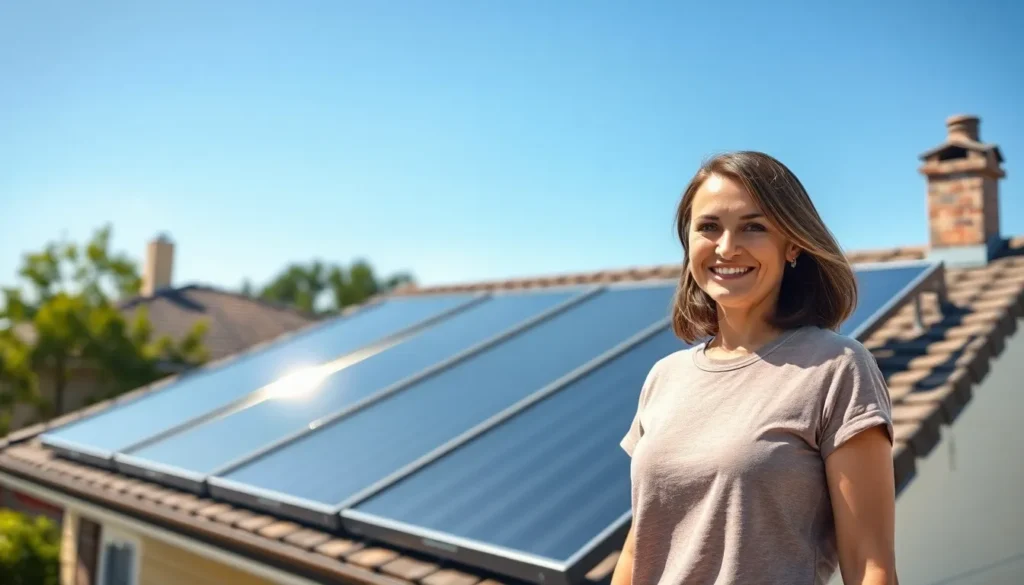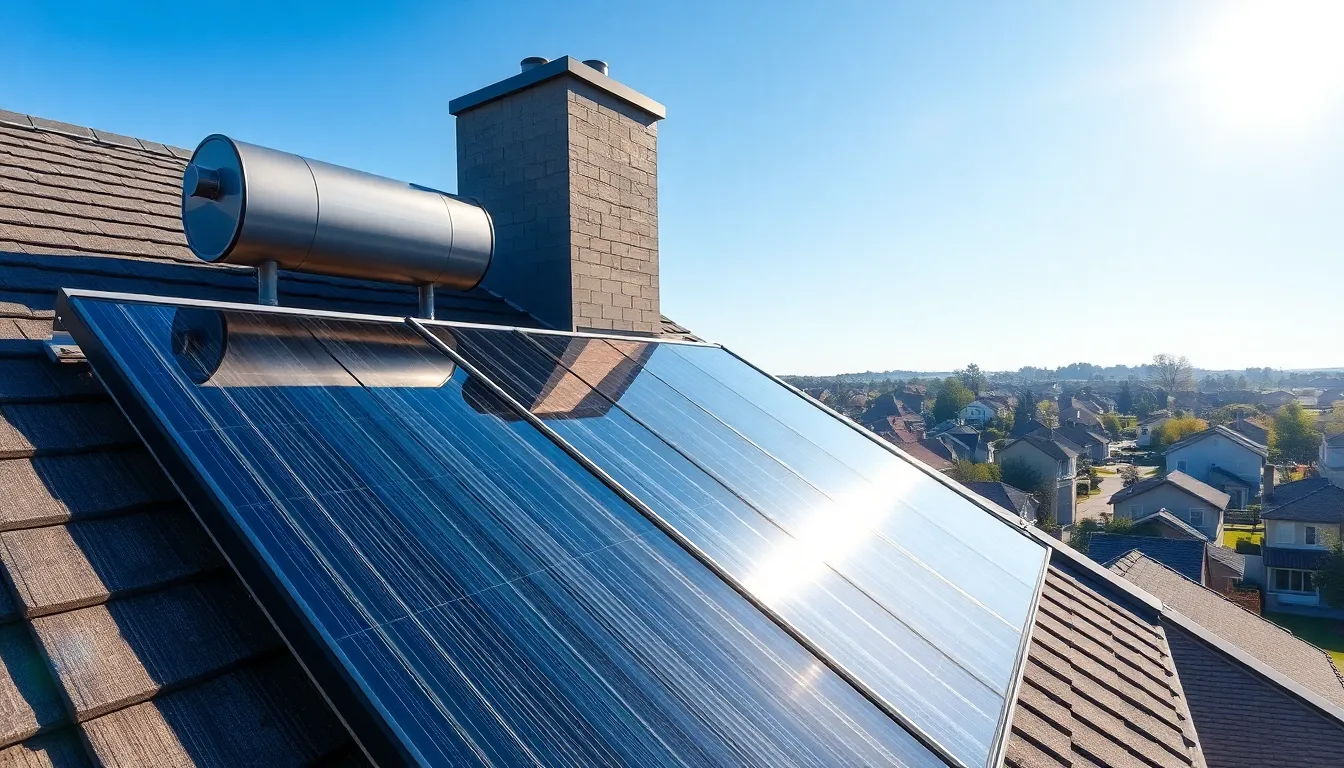Imagine waking up to a hot shower every morning without worrying about skyrocketing energy bills. Sounds dreamy, right? Enter solar water heating, the superhero of home energy solutions. It captures the sun’s rays and transforms them into warm, blissful water. Not only does it pamper you with comfort, but it also gives your wallet a break and helps the planet breathe a little easier.
Table of Contents
ToggleOverview of Solar Water Heating
Solar water heating systems utilize solar energy to heat water for residential or commercial use. The technology consists of solar collectors, which capture sunlight, and a storage tank, where the heated water is stored for later use. These systems can provide significant reductions in electric bills, with potential savings ranging from 50% to 80% on water heating costs.
Two main types of solar water heating systems exist: active systems and passive systems. Active systems use electrical pumps to circulate water through the collector, while passive systems rely on natural circulation without moving parts. The choice between these systems often depends on budget and space.
Installation of solar water heating systems connects to separate plumbing for the water supply. This allows homeowners to use heated water for various applications, including showers and dishwashing. Non-toxic materials in collectors contribute to environmental sustainability, ensuring little negative impact on the planet.
Maintenance requirements for solar water heaters are relatively low, with periodic inspections recommended to optimize performance. Monitoring the system helps identify any maintenance needs early, preventing costly repairs.
Integration with existing heating systems often occurs, offering a seamless transition to renewable energy. Many homes successfully utilize solar water heaters in conjunction with traditional boilers or electric water heaters. This adaptability makes solar technology suitable for diverse climates and settings.
In many regions, financial incentives exist to encourage adoption of solar water heating systems. Tax credits, rebates, and grants help offset initial installation costs, making this technology more accessible. Sufficient funding options enhance its attractiveness, making it a widely considered choice for energy-efficient households.
Types of Solar Water Heating Systems
Two primary types of solar water heating systems exist, each with unique characteristics and benefits.
Active Solar Water Heating Systems
Active solar water heating systems utilize electric pumps to circulate water. These systems typically consist of solar collectors, storage tanks, and a control system. An electric pump increases efficiency by providing quicker heat transfer, making them suitable for larger households. Some models allow for enhanced temperature control, offering flexibility for various weather conditions. Homeowners can expect electric bill savings ranging from 50% to 80% compared to traditional heating methods. When opting for installation, consider budget and space availability for optimal performance.
Passive Solar Water Heating Systems
Passive solar water heating systems rely on natural circulation, making them simpler and more cost-effective. These systems typically incorporate a solar collector and a storage tank, often positioned to maximize sunlight exposure. They function effectively without electric pumps, reducing maintenance concerns and energy consumption. Homeowners can generally experience less complexity during installation due to their straightforward design. With a life expectancy of 20 years or more, passive systems provide lasting benefits and reliability for residential water heating needs.
Benefits of Solar Water Heating
Solar water heating offers numerous advantages for homeowners seeking energy-efficient solutions. By harnessing the power of the sun, these systems provide consistent hot water while reducing reliance on conventional energy sources.
Energy Efficiency
Solar water heating systems convert sunlight into thermal energy, making them highly efficient. They can capture up to 80% of the available solar energy, depending on the system and location. Active systems utilize electric pumps to circulate water, delivering optimal efficiency, ideal for larger households. Passive systems, while simpler, also provide impressive energy savings through natural circulation. Overall, both options contribute toward significant reductions in energy consumption, appealing to those committed to sustainability.
Cost Savings
Investing in solar water heating systems leads to substantial cost savings on energy bills. Homeowners often save between 50% to 80% on water heating expenses, depending on usage patterns and system efficiency. Government incentives, such as tax credits and rebates, further reduce upfront installation costs, enhancing affordability. Over time, the system can pay for itself through savings on utility bills, making it a long-term financial benefit. Additionally, increasing energy prices makes the initial investment in solar water heating even more worthwhile.
Considerations for Implementing Solar Water Heating
Implementing solar water heating requires careful thought about various factors that impact efficiency and effectiveness.
Location and Climate
Solar water heating relies heavily on sunlight availability. Regions with consistent sunlight maximize energy capture, significantly enhancing system performance. In cooler climates, it’s essential to assess sunlight exposure throughout the year to ensure adequate heating. While some areas experience seasonal variations in solar radiation, others maintain high averages, making them ideal for solar installations. Additionally, local weather patterns can influence efficiency, so understanding these elements contributes to making informed decisions.
Installation and Maintenance
Proper installation ensures optimal performance of solar water heating systems. Engaging certified professionals guarantees compliance with local regulations and safety standards. During installation, aligning the system to the sun’s path increases its efficacy. Maintaining solar water heaters requires minimal effort, but periodic inspections are crucial for long-term performance. Cleaning the solar collectors helps maintain efficiency, as dirt or debris can hinder sunlight absorption. Regular checks also provide opportunities to identify potential issues early, ensuring reliability and energy savings.
Conclusion
Solar water heating stands as a practical and sustainable choice for homeowners looking to reduce energy costs while benefiting the environment. With systems designed to harness the sun’s energy effectively, users can enjoy significant savings on their energy bills. The combination of government incentives and long-term financial benefits makes solar water heating an attractive investment.
As more people become aware of its advantages, the shift towards renewable energy solutions like solar water heating continues to grow. By choosing this eco-friendly option, homeowners not only enhance their comfort but also contribute to a more sustainable future. Embracing solar water heating is a step toward energy independence and environmental responsibility.










